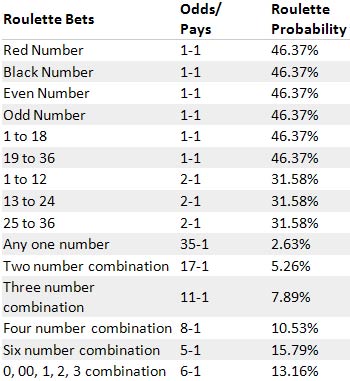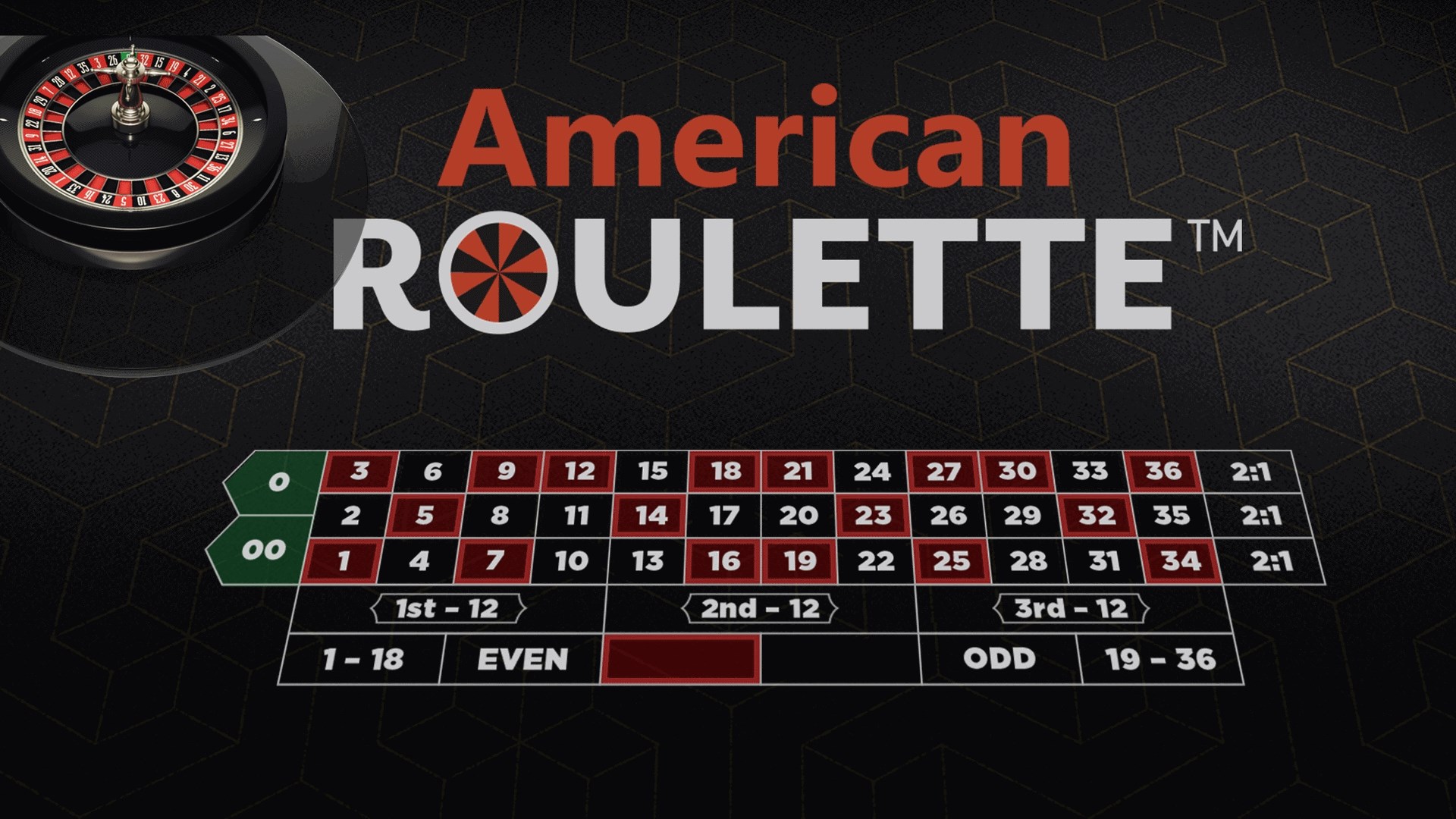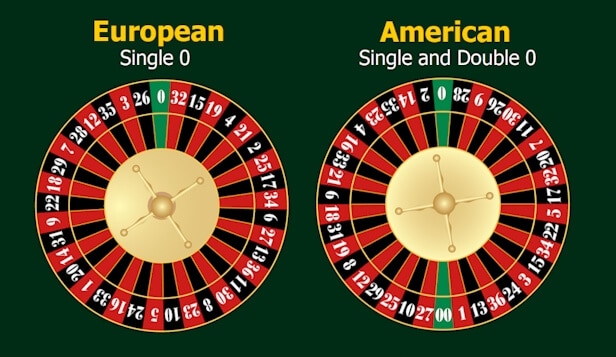Roulette is a very simple game in its nature. It's played using a roulette wheel that has 37 or 38 numbered and colored slots on it: European (French) roulette: numbers from 1 to 36 (red or black) and 0 (green) American (double zero) roulette: numbers from 1 to 36 (red or black), 0 and 00 (green). Roulette is a drain on your wallet simply because the game doesn't pay what the bets are worth. With 38 numbers (1 to 36, plus 0 and 00), the true odds of hitting a single number on a straight-up bet are 37 to 1, but the house pays only 35 to 1 if you win! Ditto the payouts on the combination bets. The potential payout odds in roulette are stated in the form of x to 1, which means you'll win x dollars for every 1 dollar you bet. For example, a single-number bet offers a payout of 35 to 1. How to Play Roulette. Roulette has offered glamour, mystery, and excitement to casino-goers since the 17th century. The game is popular in casinos worldwide in part because its rules are relatively simple and easy-to-understand.
The idea of working in a casino as a roulette dealer would seem to be something of a glamorous career move. Dealing roulette to the rich and famous sounds very enticing.
You'll be dealing with a range of different people, who will be often be gambling a large amount of money at a table. Here, we take a look at all of the key skills you'll need to become a roulette dealer and some of the extra benefits you might enjoy by doing this job.
Roulette Dealer Training – A Head for Numbers
This is one of the most important factors in dealing roulette
During the training for how to deal roulette, you'll have a full understanding of the odds for every bet, which you'll have to apply at the table. A busy table might see you having to work out the winning payout for a large number of bets. Single numbers pay 35 to 1 so an understanding of the 35 times table might be beneficial.

Roulette Payout Practice
There are some roulette payout tricks as you continue to learn roulette for working out the payout. Getting to know these becomes a very important as it allows you to service your players without taking a long pause to calclate payouts and ruin the fun.

Roulette Payout Tricks
Trick 1: For a straight bet at 35 to 1, you could cut the stake in half, multiply by seven and then add a zero. Using this example, a $6 bet is halved to $3, multiplied by seven to make $21 and a zero added to make $210 which is the winning amount for a $6 straight bet.
Trick 2: For the splits bet that pay 17:1 you're best to know your times' table from 1-10 x 17. This will allow for you to double that number whenever you have more than 10 splits to pay out. Remembering 17×17=289 will come in handy to memorize.
Trick 3: The way a dealer adds the payouts is another trick worth noting. Roulette dealers look for patterns in the placement of chips which make it easier to calculate the payout for each player. These patterns which they refer to as picture bets are taught when they are being trained.
Easy Way To Learn Roulette Payouts Real Money
Roulette Training – Communication Skills
When you're a roulette croupier you'll need to be able to communicate well
There'll be players who are playing for the first time, so you may need to explain the game to them. You'll have to communicate to the whole table when the betting is over in a clear manner. There'll also be occasions when a player might need clarification on a particular roulette rule or technique at a table.

Important: Speaking a foreign language is very helpful as many roulette players come from around the world to enjoy playing roulette for money so giving them few tips for roulette may earn you a nice tip
Roulette Training – Personal Skills
You'll have people at the table at both ends of the emotional spectrum as gambling can be a very emotional game at times. A proper roulette etiquette will be required from you and from the players.
It's never a problem having happy players at the table, but on occasions, you'll have a player who is upset or angry when playing. Having the ability to deal with these situations in a calm and considered way is essential when being a roulette dealer.
How To Become A Roulette Dealer?
Pros of being a roulette dealer
As a roulette dealer, you'll receive regular breaks, usually working a table for an hour at a time and then gaining a 20-minute break before returning to the table.
You'll find a great amount of flexibility when it comes to your working hours. Some casinos are open for a large number of hours a day (some never close) so there will be a great number of shifts needing to be covered. You might find yourself as part of a particular team, where you'll cover the shifts between you.
Cons of being a roulette dealer
There'll be many times when you'll be working unsociable hours, with the majority of the work taking place in the evenings and at the weekend.

Roulette Payout Practice
There are some roulette payout tricks as you continue to learn roulette for working out the payout. Getting to know these becomes a very important as it allows you to service your players without taking a long pause to calclate payouts and ruin the fun.
Roulette Payout Tricks
Trick 1: For a straight bet at 35 to 1, you could cut the stake in half, multiply by seven and then add a zero. Using this example, a $6 bet is halved to $3, multiplied by seven to make $21 and a zero added to make $210 which is the winning amount for a $6 straight bet.
Trick 2: For the splits bet that pay 17:1 you're best to know your times' table from 1-10 x 17. This will allow for you to double that number whenever you have more than 10 splits to pay out. Remembering 17×17=289 will come in handy to memorize.
Trick 3: The way a dealer adds the payouts is another trick worth noting. Roulette dealers look for patterns in the placement of chips which make it easier to calculate the payout for each player. These patterns which they refer to as picture bets are taught when they are being trained.
Easy Way To Learn Roulette Payouts Real Money
Roulette Training – Communication Skills
When you're a roulette croupier you'll need to be able to communicate well
There'll be players who are playing for the first time, so you may need to explain the game to them. You'll have to communicate to the whole table when the betting is over in a clear manner. There'll also be occasions when a player might need clarification on a particular roulette rule or technique at a table.
Important: Speaking a foreign language is very helpful as many roulette players come from around the world to enjoy playing roulette for money so giving them few tips for roulette may earn you a nice tip
Roulette Training – Personal Skills
You'll have people at the table at both ends of the emotional spectrum as gambling can be a very emotional game at times. A proper roulette etiquette will be required from you and from the players.
It's never a problem having happy players at the table, but on occasions, you'll have a player who is upset or angry when playing. Having the ability to deal with these situations in a calm and considered way is essential when being a roulette dealer.
How To Become A Roulette Dealer?
Pros of being a roulette dealer
As a roulette dealer, you'll receive regular breaks, usually working a table for an hour at a time and then gaining a 20-minute break before returning to the table.
You'll find a great amount of flexibility when it comes to your working hours. Some casinos are open for a large number of hours a day (some never close) so there will be a great number of shifts needing to be covered. You might find yourself as part of a particular team, where you'll cover the shifts between you.
Cons of being a roulette dealer
There'll be many times when you'll be working unsociable hours, with the majority of the work taking place in the evenings and at the weekend.
How To Learn Roulette Payouts
Important: Being a dealer at a casino offers lower job security than some other occupations
Many dealers at casinos have been doing the job for a great amount of time, so you won't get to deal on the more lucrative tables until you reach this level yourself.
Roulette Croupier – Training
Many roulette croupiers have learned their trade through a dealer school provided by the casino or a vocational course at a local community college.
You'll find the vocational courses to learn to deal roulette in areas where casinos thrive, a prime example of this being Las Vegas, Nevada. In these courses, you'll learn all aspects of casino dealing, including blackjack and poker alongside roulette and you'll also learn the local rules and regulations that might apply.
Remember: These courses will not always guarantee a job. Although they will give you a head start, you'll have to go through a standard interview process and demonstrate your roulette dealing abilities
There are dedicated web sites for those wanting a career working in a casino, and you'll find them quickly and easily by typing 'casino jobs' into a search engine. Alongside dealer jobs, you might find other areas in a casino which you might be suited to – examples of these being a cashier or working in the surveillance department.
Casino Roulette Dealer Manual
Each course will provide you with a roulette dealer manual. However, if you would like to get a head start and practise roulette rules you can find few of them if you search on the internet. We at BestRoulette.net tend to recommend an old classic 'Roulette dealer: Instruction manual' which you can find either on Amazon or your local library.

